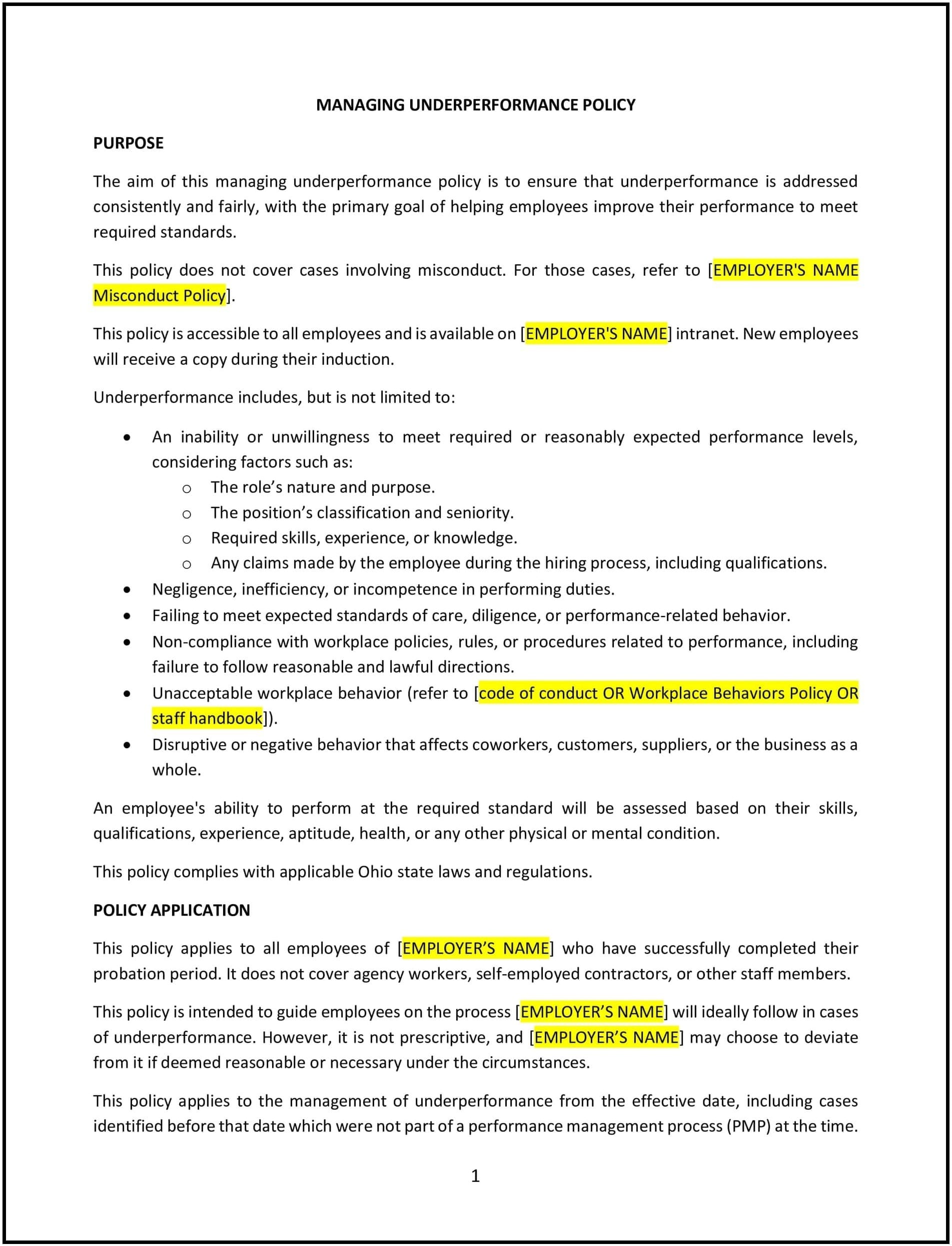Managing underperformance policy (Ohio): Free template
Got contracts to review? While you're here for policies, let Cobrief make contract review effortless—start your free review now.

Customize this template for free
Managing underperformance policy (Ohio)
A managing underperformance policy provides Ohio businesses with guidelines for addressing and managing employee performance issues. This policy outlines the steps managers and HR personnel should take to identify, address, and resolve performance problems, ensuring that employees are given appropriate support and feedback. It includes procedures for setting performance expectations, providing feedback, offering improvement plans, and following up on progress. The policy also defines the consequences of continued underperformance and provides guidance on how to handle performance-related terminations.
By implementing this policy, Ohio businesses can effectively manage underperformance, improve employee productivity, and maintain a positive work environment while minimizing legal risks.
How to use this managing underperformance policy (Ohio)
- Set clear performance expectations: The policy should outline how employees' job roles and performance expectations will be defined, communicated, and documented. This includes setting specific, measurable, achievable, relevant, and time-bound (SMART) goals.
- Provide regular feedback: The policy should emphasize the importance of ongoing feedback, both positive and constructive, to help employees understand their performance and identify areas for improvement. Regular one-on-one meetings and performance reviews should be encouraged.
- Offer support and development opportunities: The policy should specify the steps managers will take to support underperforming employees, including providing additional training, mentoring, or coaching to help them meet performance expectations.
- Implement performance improvement plans (PIPs): If an employee’s performance continues to fall short, the policy should outline the process for creating a performance improvement plan. The PIP should be a formal, written document that sets specific performance goals, timelines for improvement, and the consequences of not meeting expectations.
- Document performance issues: The policy should emphasize the importance of documenting all performance-related discussions, feedback, and actions taken to address underperformance. This documentation serves as a record for both the employee and the business, ensuring transparency and consistency.
- Provide a fair and consistent process: The policy should ensure that the process for addressing underperformance is fair and consistent, with the same procedures applied to all employees. It should also address the importance of maintaining confidentiality throughout the process.
- Define consequences for continued underperformance: The policy should specify the consequences of continued underperformance, such as reassignment, demotion, or termination, and outline the process for handling such outcomes.
- Support employee well-being: The policy should acknowledge that personal issues or other factors may affect performance and provide guidance on how managers can offer support, such as connecting employees with resources or adjusting workloads where necessary.
- Review and update regularly: The policy should be reviewed periodically to ensure it aligns with Ohio state laws, federal regulations, and the evolving needs of the business.
Benefits of using this managing underperformance policy (Ohio)
This policy provides several key benefits for Ohio businesses:
- Increases employee productivity: By addressing performance issues early and providing the necessary support, the policy helps improve employee productivity and performance.
- Promotes fairness and consistency: The policy ensures that all employees are treated fairly and consistently when performance issues arise, reducing the risk of discrimination or favoritism.
- Reduces legal risks: By following a clear and documented process, the policy helps minimize the risk of legal claims related to unfair treatment, wrongful termination, or discrimination.
- Supports employee development: The policy emphasizes professional growth and development, providing employees with opportunities to improve their performance and skills, which can lead to higher job satisfaction and engagement.
- Enhances communication: Regular feedback and performance reviews foster open communication between managers and employees, which helps to clarify expectations, identify potential issues early, and strengthen working relationships.
- Improves employee retention: Addressing performance issues in a constructive and supportive manner can help prevent turnover by giving employees the opportunity to improve and succeed within the organization.
- Fosters a positive work environment: A transparent and fair process for managing underperformance helps create a work environment where employees feel valued, supported, and motivated to perform their best.
Tips for using this managing underperformance policy (Ohio)
- Communicate the policy clearly: Ensure that all employees are aware of the managing underperformance policy by including it in the employee handbook, discussing it during onboarding, and training managers on how to implement it effectively.
- Provide clear and specific feedback: Managers should offer clear, specific, and actionable feedback during performance discussions. Employees should understand exactly what is expected and what steps they can take to improve.
- Focus on development: Instead of focusing solely on negative aspects of performance, the policy should encourage managers to take a developmental approach, offering resources, training, and guidance to help employees improve.
- Monitor progress: Regularly track the progress of employees on performance improvement plans and ensure that they receive the necessary support and guidance. Managers should document each step of the process and adjust the plan if necessary.
- Offer coaching and support: Provide coaching or mentoring to employees who may need additional support to meet performance expectations. This may include pairing employees with more experienced colleagues or offering additional training programs.
- Address issues early: Managers should address performance issues as soon as they arise, rather than waiting until they become larger problems. Early intervention helps prevent issues from escalating and allows employees to improve before facing more serious consequences.
- Maintain confidentiality: All discussions about underperformance and performance improvement plans should be conducted confidentially to protect employees' privacy and maintain a professional environment.
- Review and update regularly: Regularly review and update the policy to ensure it remains effective and aligned with Ohio state laws, federal regulations, and the business’s changing needs.